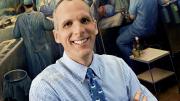In college he was a varsity fencer with high-profile mentors: Simon Schama taught narrative history to Ackerman professor of the culture of medicine David S. Jones ’92, M.D. ’97, Ph.D. ’01, and Steven Jay Gould advised his history and science honors thesis on Mount Vesuvius. But geological science frustrated him—“It was studying events you would never get to observe.” Later, Cold War medical ethics captivated Jones when he studied human subjects injected with plutonium or exposed to nuclear test blasts in Nevada. Antibiotic research on the Navajo reservation in the 1950s looms large in his 2004 book (completed during his psychiatric residency), Rationalizing Epidemics: Meanings and Uses of American Indian Mortality since 1600, which illuminates the European-sourced epidemics that decimated the Native American population. Jones’s current work explores the history of coronary-artery bypass surgery and the cycles of innovation/enthusiasm/disappointment that repeat when clinical trials fail to confirm initial expectations. While on the faculty of MIT’s Program in Science, Technology, and Society, he began teaching at Harvard Medical School (HMS) in 2007; in 2011 he was named to the new Medical School/Arts and Sciences Ackerman professorship, with a mandate to create a program in culture and medicine. He teaches social medicine to HMS students and an undergraduate course on history and medical ethics. Jones and his wife, pediatrician Elizabeth Caronna, M.D. ’97, live in Newton (where he jogs by the river) with their young son and daughter. They began dating during their microbiology class, but had first met in a medicine and literature course, which, he says, sounds “a bit more romantic.”
Short profile of David Jones, Ackerman professor of the culture of medicine
Short profile of David Jones, Ackerman professor of the culture of medicine
David Jones, Ackerman professor of the culture of medicine, works in both history and medicine.

You might also like
What Bonobos Teach Us About Female Power and Cooperation
A Harvard scientist expands our understanding of our closest living relatives.
Eating for the Holidays, the Planet, and Your Heart
“Sustainable eating,” and healthy recipes you can prepare for the holidays.
Five Questions with Michèle Duguay
A Harvard scholar of music theory on how streaming services have changed the experience of music
Most popular
Explore More From Current Issue

Rabbi, Drag Queen, Film Star
Sabbath Queen, a new documentary, follows one man’s quest to make Judaism more expansive.







